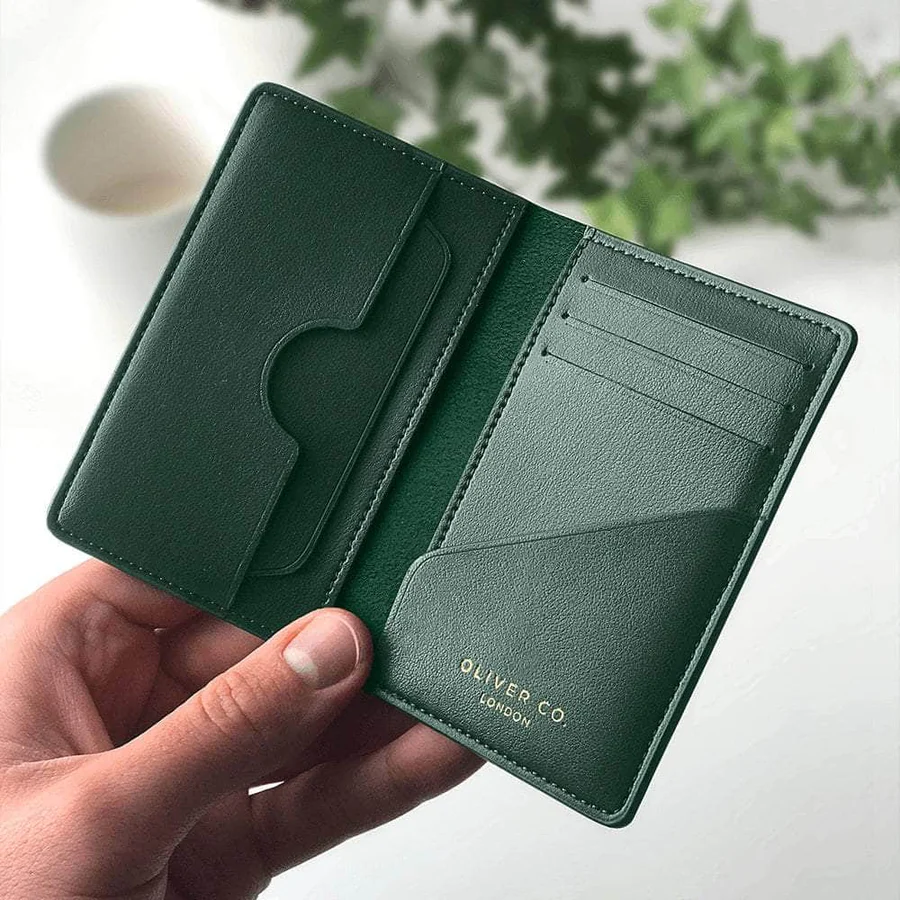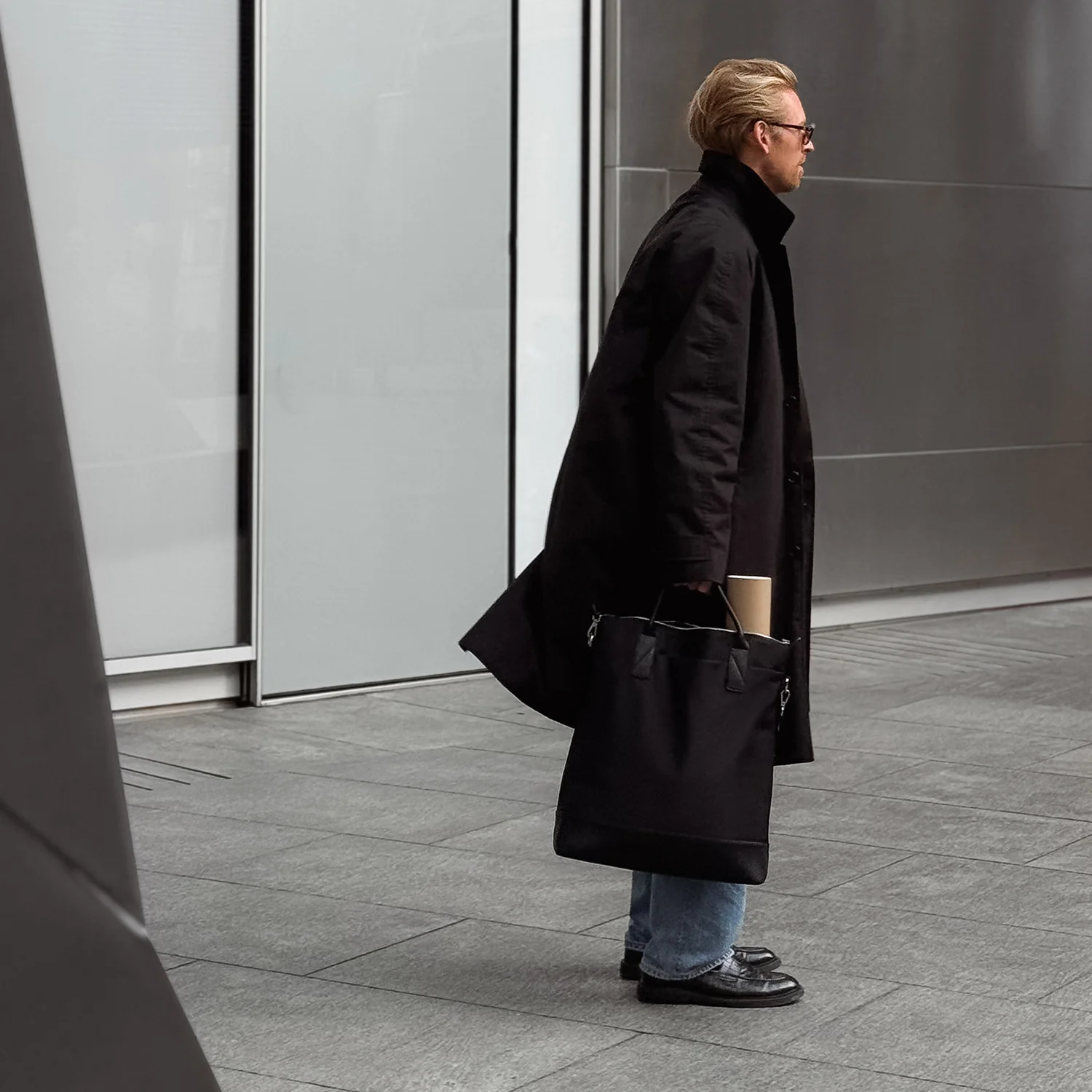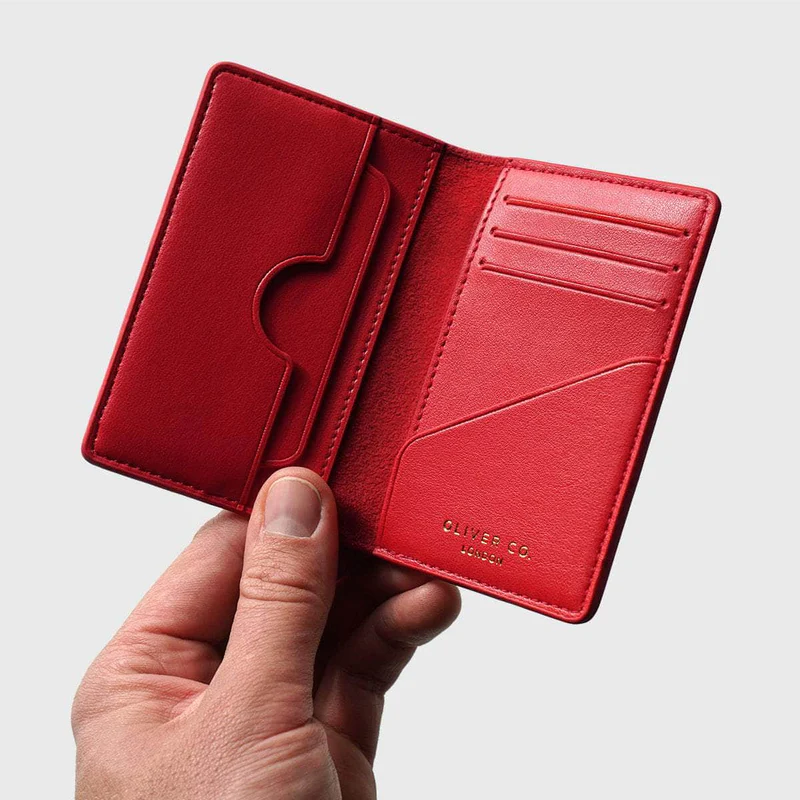What Does Apple Leather Feel Like?

Share This Article
Learning about Oliver Co. apple leather accessories and their commitment to sustainability and innovation.
| All products featured on The Wellness Feed are independently selected by our editors for its environmental and ethical impact. However, when you buy something through our retail links, we may earn an affiliate commission. |
Alternative leathers aim to provide a sustainable substitute for conventional leathers in texture, durability, versatility, and overall quality. This is a tall order to fill, but recent innovations have given us some incredible options. One innovator within this space is Oliver Co., a brand that makes sleek vegan wallets and other small leather goods from apple and wood leathers.
I was fortunate enough to try out one of Oliver Co.’s compact vegan wallets courtesy of the company. I’ve gone through my fair share of wallets in my life, so I’ve developed some strong opinions over the years. That said, Oliver Co. wallets give high quality leather wallets a run for their money (pun intended). But don’t just take my word for it; you can check out what writers at GQ, The Guardian, and Stylist Magazine have to say about them too.
After trying the Compact Wallet for a couple weeks, I had the opportunity to speak to Oliver Co.’s founder, Matt Oliver. We had a great conversation about Oliver Co.’s materials, their sustainable and ethical initiatives, and what’s coming down the line from them. Read on for my review of Oliver Co.’s Compact Wallet, as well as more insight from my conversation with Matt Oliver.
How does apple ‘leather’ compare to regular leather?
About a month ago, I opened up a package from Oliver Co. and found a personal note from Matt Oliver, as well as the brand’s signature Compact Wallet in black. To the American eye–or at least my American eye–this wallet lives up to its name. It is quite small; easily the smallest wallet I’ve ever owned. But, I was able to put my driver’s license, two credit cards, my car and health insurance cards, and my cash in the wallet with no problem. While my old wallet still had a few gift cards, frozen yogurt punch cards, and several out of date insurance cards in it, the compact wallet easily fit all of the essentials.
For the past few weeks I’ve really enjoyed using the compact wallet. It’s surprisingly light and slim. This means that it can just as easily and comfortably fit in a side pocket as it can a back pocket. As someone who wears a lot of joggers and running shorts as part of a work-from-home uniform, this is essential. And as someone who frequently spills drinks, folds shorts without taking their wallet and keys out, and is pretty clumsy, I feel confident in saying that this wallet is durable. I haven’t quite put it through the ringer, but it holds up to everyday use just as well as any leather wallet I’ve owned.
Men’s Spring 2024 Trend: Crossbody, Clutches, and Transparency
Now from an aesthetic point of view, this wallet looks good. I don’t own many accessories so I really care about the way my wallets look. I want them to be a conversation starter or even a part of an outfit; Oliver Co. wallets fit the bill (once again, pun intended). I’ve shown mine off to every person I’ve talked to in the past few weeks and they’ve all agreed that this wallet is, in a word, cool. It’s sleek, sharp, and luxurious; the kind of wallet you want to take out and hold in your hand before you get up to the register.
In short, Oliver Co. has managed to create a wallet that lives up to its promise. It’s convenient to wear, cool to look at, and just as durable and beautiful as any leather wallet. You’d never guess that it’s made from apple leather, but knowing that makes it even better. (Trust me, telling people the wallet they just complimented is made from apple waste is a true joy). Ultimately, the result is a wallet that you can feel good about owning without having to compromise on quality.
Repurposing waste for luxury accessories
Part of what makes Oliver Co.’s wallets so special is their materials: apple and wood leather and a 100% recycled polyester lining. When I spoke with Matt Oliver, he told me that while working in product design for watches he developed an interest in leather. When he saw the problems with conventional leather, he decided to delve into the world of alternative leathers. And in 2017, Oliver Co. was born.
Whereas the leather industry is infamous for emitting dangerous amounts of carbon, polluting, and overusing water, alternative (also known as biobased) leathers promise a more sustainable solution. Apple lather is a particularly interesting alternative to conventional leather because it fulfills a need. When we eat apples, we leave behind waste, like the core and the seeds and even bits of uneaten fruit and skin. Similarly, when companies process apples for juice and compote, they leave behind solids. As Oliver explained to me, this waste generally doesn’t have anywhere to go other than a landfill. Luckily, apple leather manufacturers can take apple solids and process them, combine them with low-impact polyurethane, and then apply that material to a canvas. The result is a product with a similar texture and durability to traditional leather.
A really interesting commonality between biobased and conventional leathers is that they create unique products. This is just how natural materials work; they vary greatly. So the grain of one leather may be slightly different from the grain of another. This adds to the charm of Oliver Co.’s products and highlights another way in which apple and wood leathers can hold their own against their conventional counterparts.
But of course, creating a sustainable product that can live up to the standard of leather is a real challenge. While apple and wood leather goods replicate the character and texture of traditional leather, they’re still composites of various materials. Because of the polyurethane and canvas used to make the apple leather along with the stitching and glue used to make the wallets, they can’t just be tossed into a compost bin when they’ve finished their useful life.
The inclusion of polyurethane and other plastics in sustainable, alternative, and vegan leathers is a hot topic of conversation in the fashion world. Plastics carry baggage: they’re nonbiodegradable and they have the potential to pollute our oceans. But on the other hand, they contribute to the durability of alternative leather products. As Matt Oliver put it, “it’s a balancing act of sustainability, aesthetics, durability, and biodegradability.” This is all to say that apple leather is a great alternative, but that it isn’t perfect.
Knowing that there’s potential for an even more sustainable alternative out there, Oliver Co. hopes to keep innovating the materials used in the leather industry. Down the line they’d like to incorporate plastic-free leather alternatives into their vegan wallets. They’d also like to create products from one single material, down to the stitching and lining. Both of these innovations would make their products more biodegradable and even more unique among the growing world of alternative leathers.
Sustainability goes beyond materials
Outside of their materials, Oliver Co. employs several practices to maintain a commitment to sustainability and ethics. As Oliver said to me, “sustainability does go further than just the materials in a product.” In other words, Oliver Co. cares about the process of crafting their products and how their business is run.
One way that Oliver Co. lives up to their core values is by “giving back” to the planet and those in need. They work with 1% For The Planet; an organization that partners companies with environmental nonprofits focused on urgent environmental issues. Brands like Oliver Co. that work with 1% for the Planet donate 1% of their annual sales to these pressing environmental causes. Oliver Co. also donates their proceeds made during Black Friday. Last year, they donated to an organization that redistributes food waste to the unhoused population in London.
Oliver Co. also maintains an interest in improving their business across the board. For example, they work with their manufacturers to evaluate water usage, energy usage, and employment practices through a Self-Assurance Questionnaire (SAQ) that they’ve set up. As Oliver said, “we’re not expecting it to be a score of 100 out of 100 with these things–it’s about addressing where we can improve and then helping them to improve in certain areas.”
Oliver Co.’s commitment to improvement has led to two exciting achievements this year. First, Oliver Co. became a Climate Neutral certified carbon neutral company this Spring. This means that they’ve completely offset their carbon emissions and are now working to reduce their carbon emissions going forward by redesigning their packaging. If you want to see more specific details, you can check out their brand profile on Climate Neutral’s website.
The second achievement is that Oliver Co. has begun the process of trying to become a certified B Corporation (B Corps). Certified B Corps are businesses that are–in short–run sustainably, ethically, and transparently. Becoming a B Corp is a long process that asks businesses to evaluate nearly everything they do, including their positive output on the world. Oliver Co. is eligible to apply for their B-Corp certification in June and hopes to join the ranks of other businesses trying to redefine the ways companies impact the world.
What’s Next?

With everything Oliver Co. has achieved within the past four years, it’s exciting to think about what might come down the line. Matt Oliver told me that Oliver Co. hopes to expand its product line and dip into womenswear, as well as laptop cases, tote bags, and backpacks. Oliver Co. is also hoping to cut down on the off-cuts of their leather products, as well as incorporate their off-cuts into new designs. And as I already mentioned, they’re working on some exciting updates for their materials and packaging.
If you’re interested in sustainable leather or vegan wallets, keep an eye on Oliver Co. In just 4 years, they’ve managed to create a line of products that stand up against traditional leather goods and sustainable and ethical standards. In a month or so they may be on the way toward their B-Corp certification. In another year? We’ll just have to wait and see.

